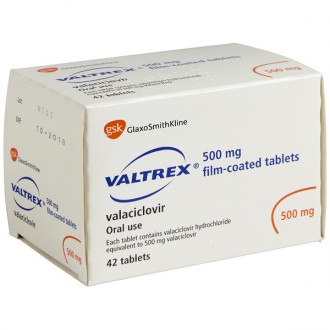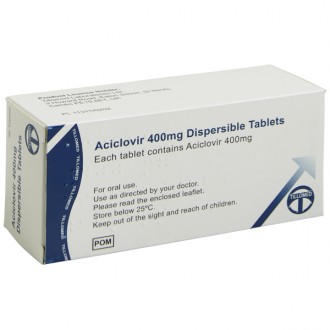Genital herpes is a common sexually transmitted infection caused by a virus called Herpes Simplex (HSV), passed on by anal, vaginal, or oral sex. It's the same virus that causes cold sores.
Unfortunately, while there is no cure for genital herpes (or cold sores), there are treatments that can help relieve symptoms and prevent outbreaks.
At Pharmacy Online, we offer a discreet, confidential, and convenient way to access the treatment you need, directly from the comfort of your home. Start a consultation to order a prescription today.
Next-day delivery available.
Understanding Genital Herpes
Genital herpes is caused by two strains of the herpes simplex virus: HSV-1 and HSV-2. While HSV-1 is often linked to cold sores around the mouth, it can also result in genital herpes. HSV-2, on the other hand, is the strain more commonly associated with genital outbreaks.
The virus is transmitted through direct contact with an infected person, primarily through anal, vaginal, or oral sex. This means that any sexual activity with someone who has the virus, even if they don't have visible sores, can lead to infection.
It's important to note that, currently, there is no cure for genital herpes. However, this doesn't mean you're without options. While the virus may remain in your body, antiviral medicine is available to help relieve symptoms and prevent outbreaks, significantly managing the condition and improving your quality of life.
Symptoms of genital herpes virus
If you catch the herpes virus during sexual intercourse without barrier protection (e.g., condoms), symptoms tend to appear 2 weeks after initial exposure to either type.
Symptoms of genital herpes can vary widely among individuals. Some people may experience painful blisters or sores in the genital area, itching, and flu-like symptoms such as fever and swollen lymph nodes during outbreaks. However, it's also possible for others to carry the virus without displaying any outward signs, a condition known as asymptomatic shedding, where the virus can still be transmitted to others even in the absence of visible symptoms.
Initial outbreaks of genital herpes can be more severe, including blisters or sores around the genitals or rectum, pain during urination, and flu-like symptoms such as fever and swollen lymph nodes.
Some people with genital herpes may experience a return of signs and symptoms 4 to 6 weeks after initial onset. These outbreaks are usually milder and shorter in duration than the first outbreak. People who have repeated recurrences of genital herpes often refer to them as “flare-ups” or “outbreaks.”
The symptoms of genital herpes can vary greatly depending on whether you're experiencing an initial episode or recurring episodes, but essentially, common signs and symptoms include:
- A headache that lasts longer than 12 hours
- Fatigue (tiredness) lasting more than 12 hours
- Flu-like symptoms, including fever for up to three days (mild)
- Swollen lymph nodes (swollen glands)
- Muscle aches and pains lasting more than 12 hours
- Small painful blisters or lesions (open sores) that appear within 24 hours. Sometimes these blisters break open and become sores made up of fluid filled bubbles called vesicles. Lesions are itchy several days before they appear. The sores eventually crust over and heal without scarring in 2 to 3 weeks if left untreated.
Diagnosing genital herpes
Diagnosing genital herpes typically involves a physical examination, usually at a local sexual health clinic, and a swab test of the affected area. If you're experiencing symptoms that you suspect might be related to genital herpes, seeking medical advice promptly is crucial.
Early diagnosis and treatment can not only help manage the symptoms but also reduce the risk of transmitting the virus to others.
When to see a doctor: recognising complications
If you suspect you have genital herpes or if you're experiencing complications related to the condition, seek medical advice. Early intervention can significantly help your health and well-being.
Some key moments when you should consider seeing a doctor:
- If, during recurrent outbreaks, symptoms worsen, or you develop new symptoms
- If you suspect you have initial symptoms
- If the frequency of your recurrent genital herpes is increasing
- During pregnancy, women with genital herpes need to be aware that genital herpes can be transmitted to the baby during childbirth
Genital herpes treatments from Pharmacy Online
While there is no cure for genital herpes, it is manageable with medicines in the form of antiviral medications, which are available as creams, tablets, and capsules.
They can stop the symptoms from getting worse if you start taking the medication for genital herpes within 5 days of an outbreak. They can also reduce the frequency of recurrent outbreaks of genital herpes by more than half. When used correctly, they can also reduce the risk of transmission to others when you have an active lesion on your skin (especially in areas where HSV-1 strains cause cold sore outbreaks).
At Pharmacy Online, we have a selection of approved treatments, giving you access to the best care possible:
- Aciclovir tablets: A first-line treatment for genital herpes, Aciclovir helps reduce the virus's ability to multiply, effectively managing outbreaks. Available in a dosage tailored to your needs, these genital herpes tablets are designed for both episodic and suppressive treatment.
- Valaciclovir (Valtrex) tablets: Offering a more convenient dosing schedule, Valaciclovir (Valtrex) is another effective antiviral medication that helps manage outbreaks with fewer doses compared to Aciclovir, making it a preferred option for many.
Choosing the right treatment option
Choosing between suppressive therapy (daily medication to prevent outbreaks) and episodic treatment (medication taken at the onset of an outbreak) depends on your unique health situation and how the virus affects you e.g. the frequency and severity of your outbreaks.
If you find yourself dealing with frequent and severe outbreaks, suppressive therapy might be the best route for you. This involves taking daily medication to help prevent the occurrence of outbreaks, reducing their frequency by about 70%, and minimising the risk of transmission to others.
On the other hand, if your outbreaks are less frequent or if you prefer to address symptoms as they arise, episodic treatment could be more suitable. This approach means you take medication for genital herpes at the first sign of an outbreak to shorten its duration and alleviate symptoms more quickly.
Our pharmacists at Pharmacy Online can guide you in selecting the most appropriate treatment plan based on your individual needs.
Buy Genital Herpes treatment online from Pharmacy Online
Genital herpes, while a lifelong condition, can be effectively managed with the right treatment and support. Ordering your genital herpes treatment from Pharmacy Online is straightforward and discreet.
Start by completing our online consultation form, where you'll provide details about your medical history and symptoms. A UK-registered doctor will review your information and prescribe the appropriate treatment. Your medication will then be discreetly packaged and delivered to your doorstep, ensuring privacy and convenience.
Would you like to speak to a pharmacist?
If you have concerns about your genital herpes or oral herpes medicine, ask a member of our team about the available genital herpes treatment over the counter options we have today.







